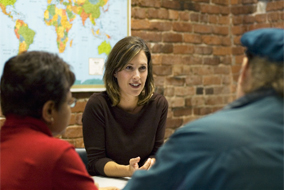
Marisol Petersen created a program that uses local skills to create change in Vancouver’s Downtown Eastside - photo by Martin Dee UBC Reports | Vol. 53 | No. 10 | Oct. 4, 2007
Bridging Communities
Downtown Eastside Residents Connect With Immigrants at the UBC Learning Exchange
By Julie-Ann Backhouse
Vancouver’s Downtown Eastside receives a lot of media attention as home to people who are destitute and disadvantaged. Yet, it’s also a community where people share the best of what they have to give.
At the UBC Learning Exchange storefront on Main Street, residents are volunteering to help immigrants practice their conversational English skills. Called ‘ESL facilitators,’ these residents encourage immigrants to speak confidently and explain the use of Canadian idioms like “What’s up?” and “Take it easy.”
For some newcomers, these weekly conversation groups are so prized that many English-learners will travel from as far as Richmond and Surrey to attend. As Judy Chen, an immigrant from Hong Kong explains, “It helps immigrants step out from their homes, make new friends, share experiences, exchange resources, and improve English.”
This ESL program has produced some strong results by tapping into this community’s best resource -- its people.
“There are many residents here who have a wealth of knowledge and the time and willingness to share with others,” says Program Coordinator Marisol Petersen, a UBC graduate from the School of Community and Regional Planning (SCARP). “Having this kind of leadership role is great for self-esteem and it builds confidence in people who, for various reasons, are marginalized.”
More than just providing English language skills, the program is generating mutual understanding -- between immigrants and local residents alike.
“What is unique is that people are seeing each other’s differences in age, class, ethnicity, and culture as learning opportunities rather than as barriers,” says Petersen.
Like others in this community, Eva Eder has not had it easy in life and yet a year ago she found the courage to volunteer as an ESL facilitator. Remarkably English is not her first language, nor is it her second, third or fourth language -- it’s her fifth.
“I found that I have infinite patience because English is my fifth language and I understand people’s confusion, especially older people,” says Eder who lives around the corner from the Learning Exchange and taught herself English via crossword puzzles. “I get so much back from my students and when I’m teaching I forget my troubles.”
Eder starts her classes with a song and likes to use humour to teach the nuances of English and to keep things light. She notes that people often break into song when they see her on the street but she says the biggest reward is the recognition on a person’s face when they comprehend a phrase, sentence or joke.
This ESL program is so successful that no recruitment is necessary. It continues to grow, attracting people simply by word of mouth. Over the past three years 80 facilitators from the community have led some 2,000 conversation group sessions for more than 450 immigrants.
The idea to strengthen the social fabric of the Downtown Eastside by connecting local skills with local needs grew from Petersen’s studies at SCARP. She was invited by the Learning Exchange to create an inventory of skills and a pilot program that could build upon those skills. The pilot was a success, HSBC Bank Canada contributed ongoing funding and the UBC English Language Institute (ELI) came on-board to deliver training.
The ELI conducts training once a week for 10 weeks for all ESL facilitators. Academic Director Andrew Scales and teacher Trish Fodor developed a specific syllabus after sitting in on the conversation classes. As Scales noted it was important to train the facilitators with practical tools, not theory, to get the immigrants speaking confidently.
Next year the Learning Exchange hopes to expand this program into East Vancouver schools where immigrant parents and guardians will have the chance to practice their English with ESL facilitators. The program will take place in schools and will include child minding services.
For more info: www.learningexchange.ubc.ca.
65 Downtown Eastside Residents Trained by UBC ELI
Earlier this year the UBC English Language Institute received an award for excellence for their work with the UBC Learning Exchange ESL Program from the Canadian Association for University Continuing Education, garnering praise for having a ‘commendable vision to strengthen civil society.’ To date the UBC ELI has trained 65 Downtown Eastside residents. The ELI opened in 1969, and welcomes thousands of international students through its doors every year.
For more info: www.eli.ubc.ca. |
